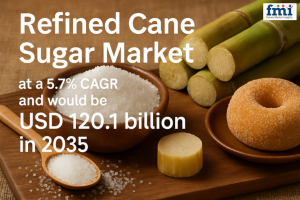Refined Cane Sugar Market to Reach USD 120.1 Billion by 2035 As Rising Demand for Processed Food and Beverage Ingredient
Growing urbanization, evolving dietary preferences, and expanding industrial usage are key factors fueling the global refined cane sugar market.
Refined cane sugar is derived by removing all non-sugar elements from raw cane sugar, resulting in a pure and consistent sweetener. The product’s widespread adoption in bakery, confectionery, dairy, and beverages positions it as a critical ingredient in the global food supply chain. The growing trend toward convenience foods, increased popularity of desserts, and the expansion of the processed food industry have contributed significantly to the increasing consumption of refined cane sugar. Its ease of use, high shelf stability, and compatibility with large-scale manufacturing processes make it indispensable for food producers globally.
In addition, the global availability of sugarcane, particularly in tropical and subtropical regions, provides a stable supply of raw materials for refining. The flourishing dairy sector and heightened preference for sweetened products in developing regions are expected to provide consistent tailwinds to the refined cane sugar industry.
Get a Sneak Peek into the Market – Download a Free Sample: https://www.futuremarketinsights.com/reports/sample/rep-gb-16056
Organic and Non-GMO Refined Cane Sugar Gaining Traction
One of the most prominent trends reshaping the industry is the growing consumer inclination toward organic refined cane sugar and non-GMO sweetener options. With increasing awareness of health and wellness, refined sugar producers are adopting organic farming practices and clean-label processing methods to meet the rising expectations of end-users.
Additionally, the shift toward plant-based, additive-free, and minimally processed foods has further propelled the demand for processed cane sugar free from synthetic chemicals. This shift is particularly evident in developed economies, where consumer preference for non-GMO refined cane sugar is influencing product formulations in confectionery, bakery, and dairy applications.
Expanding Applications Across Food Processing and Confectionery
The refined white sugar industry continues to be a key ingredient supplier for multiple sectors, including food processing, confectionery, and beverages. In particular, refined cane sugar is widely used for flavor enhancement, preservation, texture improvement, and fermentation processes.
Bakeries and dessert manufacturers are especially reliant on refined sugar for consistency and shelf-life extension, while the beverage sector leverages its clarity and solubility properties in soft drinks, juices, and energy drinks. This growing dependence on sugar in industrial applications is a major driver for refined cane sugar demand.
Sustainability and Trade Policies Shaping the Market
The focus on sustainability trends in refined cane sugar production is reshaping the competitive landscape. Industry players are embracing environmentally friendly practices such as water conservation, reduced energy usage, and minimal waste production during sugar refining processes.
Furthermore, sugar trade policies and tariffs are playing a pivotal role in shaping global supply chains. As countries revise import-export norms to protect domestic industries and ensure food security, manufacturers are recalibrating their strategies to remain compliant and competitive in the evolving trade environment.
Stay Ahead with the Complete Market Analysis – Download Full Report: https://www.futuremarketinsights.com/reports/refined-cane-sugar-market
Patrick and Josh Lange of Business Modification Group Sell Established HVAC Company in Broward County
Southeast Addiction Center Atlanta Highlights the Urgent Need for Comprehensive Alcohol Addiction Treatment
The World’s First Literacy-Themed Gas Stations Launch a Summer Reading Adventure for Kids
Kalendarium
Więcej ważnych informacji
 Jedynka Newserii
Jedynka Newserii

 Jedynka Newserii
Jedynka Newserii

Transport

Import materiałów budowlanych z Rosji zagrożeniem dla konkurencyjności europejskiego rynku. Konieczne są zmiany i egzekwowanie sankcji
Unia Europejska powinna zrewidować politykę celną na import materiałów budowlanych spoza państw członkowskich, w tym państw wschodnich – twierdzą uczestnicy konferencji „Bezpieczeństwo gospodarcze UE”. Obecnie Wspólnota nakłada na europejskich producentów coraz więcej ograniczeń, nie rewidując polityki celnej, co przekłada się na systematyczne osłabienie konkurencyjności przedsiębiorstw, spadek produkcji i zagrożenie dla miejsc pracy.
Konsument
Polacy odczuwają brak wiedzy na temat inwestowania. Może to sprzyjać podejmowaniu nieracjonalnych decyzji finansowych

Co trzeci Polak odczuwa brak wiedzy w obszarze inwestowania, a tylko co piąty chciałby pogłębić swoją wiedzę na ten temat – wynika z badania „Poziom wiedzy finansowej Polaków 2025”. Ci, którzy na własną rękę szukają informacji i porad, coraz częściej sięgają do blogów, portali, podcastów i wideo w internecie. Eksperci przestrzegają, że finansowych i inwestycyjnych porad udzielają nie tylko specjaliści w danej dziedzinie, więc potrzebna jest zasada ograniczonego zaufania.
Handel
Do 2030 roku liczba plastikowych opakowań w e-handlu modowym może się podwoić. Ich udział najszybciej rośnie w Polsce

Wraz ze wzrostem kanału e-commerce w branży modowej rośnie liczba wykorzystywanych opakowań, z których znaczną część wciąż stanowią te z plastiku. Do 2030 roku w Polsce e-sprzedawcy zużyją 147 mln plastikowych opakowań – wynika z badania przeprowadzonego na zlecenie DS Smith. Można zauważyć rosnący trend wśród marek modowych, które coraz częściej wybierają opakowania wykonane z papieru lub materiałów z recyklingu. To o tyle istotne, że polscy konsumenci odczuwają wyrzuty sumienia z powodu ilości plastiku, w którym dostarczane są ich zamówienia.
Partner serwisu
Szkolenia

Akademia Newserii
Akademia Newserii to projekt, w ramach którego najlepsi polscy dziennikarze biznesowi, giełdowi oraz lifestylowi, a także szkoleniowcy z wieloletnim doświadczeniem dzielą się swoją wiedzą nt. pracy z mediami.









.gif)

 |
| |
| |
|